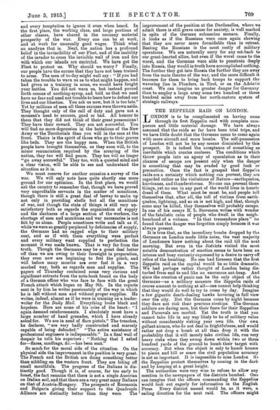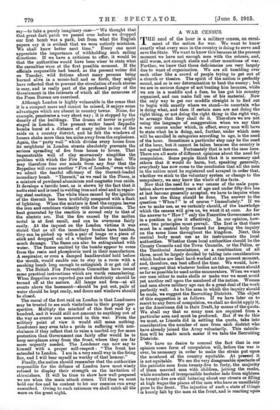THE ZEPPELIN RAID ON LONDON.
LONDON is to be complimented on having coins through its first Zeppelin raid with complete com- posure and little material damage. We have alwaya assumed that the raids so far have been trial trips, and we have little doubt that the Germans mean to come again with more aircraft and more bombs. The self-possession of London will not be by any means diminished by this prospect. It is indeed the acceptance of something as inevitable which creates coolness. The conditions which throw people into an agony of speculation as to their chances of escape are present only when the danger is something that may be evaded by good luck or precaution. Once the fact is grasped that Zeppelin raids are a certainty which nothing can prevent, they are regarded rather as the visitations of Nature—earthquakes, hurricanes, and thunderstorms. No one can prevent these things, yet no one in any part of the world lives in hourly dread of them. What must be must be, and people tell themselves that, after all, the toll of victims from earth- quakes, lightning, and so on is not high, and that, though some may be killed, they themselves will probably escape. In one of his essays R. L. Stevenson writes with wonder of the fatalistic calm of people who dwell in the neigh- bourhood of a volcano. "In that tremendous place" he found that the danger was forgotten simply because it was always present. It is true that, as the incendiary bombs dropped by the Germans on London made little noise, the vast majority of Londoners knew nothing about the raid till the next morning. But even in the districts visited the most notable demonstration of emotion seems to have been an intense and busy curiosity expressed by a desire to carry off relics of the bombing. No one had foreseen that the first Zeppelin raid on the capital would be so little dramatic. We had perhaps rather thought of London being dis- turbed from end to end like an enormous ant-heap. And since the creation of panic can be the only object of the Germans—as a military measure the Zeppelin raids of course amount to nothing at all—one cannot help thinking that they would do well to try to come by day. Imagine a few gigantic death-dealing hawks hovering in full view over the city. But the Germans come by night because they dare not risk their precious airships. The German soldiers are daring men, but their fears for their Zeppelins and Parsevals are morbid. Yet the truth is that you cannot take life in any way likely to be of military value without considerably risking your own life. Our own gallant airmen, who do not deal in frightfulness, and would rather not drop a bomb at all than drop it with the probability that it will merely take civilian life, run very heavy risks when they swoop down within two or three hundred yards of the ground to bomb their target with accuracy. But when the object is only to knock houses to pieces and kill or scare the civil population accuracy is not so important. It is impossible to miss London So the Zeppelins protect themselves by coming in the dark and by keeping at a great height.
The authorities were very wise to refuse to allow any mention in the newspapers of the districts bombed. One can imagine that the officers commanding the Zeppelins would look out eagerly for information in the English Press. Every district named would be, as it were, a sailing direction for the next raid. The officers might say—to take a purely imaginary case—" We thought that that great dark patch we passed over before we dropped
our first bomb was a park, but from what the English
papers say it is evident that we were entirely mistaken. We shall know better next time." Every one must appreciate the importance of withholding such sailing directions. If we have a criticism to offer, it would be that the authorities would have been wiser to state what the casualties were at the first possible moment. If the officials responsible had heard, as the present writer did on Tuesday, wild fictions about many persons being burned alive in a music-hall and so forth, they might have reflected that to prevent the circulation of such stories is easy, and le really part of the professed policy of the Government in the interests of which all the measures of the Press Bureau are exercised.
Although London is highly vulnerable in the sense that it is a compact mass and cannot be missed, it enjoys some advantages which are absent in country towns. Noise, for example, penetrates a very short way ; it is stopped by the density of the buildings. The drama of terror is poorly staged in London. The present writer heard Zeppelin bombs burst at a distance of many miles in one of the raids on a country district, and he felt the windows of houses shake more than ten miles away from the explosions. Again, the "party wall" which divides every house from its neighbour in London streets absolutely prevents the serious spreading of fire from house to house. That impenetrable wall of clay enormously simplifies the problem with which the Fire Brigade has to deal. We may therefore free our minds from any fear that the Zeppelins will cause another "Fire of London," even while we admit the fearful efficiency of the thermit-loaded incendiary bomb. " Thermit," as we read in the Times, is a mixture of powdered aleminium and magnetic iron oxide. It develops a. terrific heat, as is shown by the fact that it melts steel and is used in welding iron and steel and in repair- ing steel castings. The white blaze caused by the ignition of the thermit has been truthfully compared with a flash of lightning. When the mixture is fired the oxygen leaves the iron and combines violently with the aluminium. The heat generated by the reaction is second only to that of the electric arc. But the fire caused by the molten metal is at first small, and can be overcome fairly easily. At the inquest on the London victims it was stated that as all the incendiary bombs have handles, they can be picked up with a pair of tongs or a piece of stick and dropped out of a window before they can do much damage. The flame can also be extinguished with water. The fumes emitted by the bombs appear to come from the resin and phosphorus used in their manufacture. A respirator, or even a damped handkerchief held before the mouth, would enable one to stay in a room with a smelling bomb long enough to extinguish it or get rid of it. The British Fire Prevention Committee have issued some practical instructions which are worth remembering. When Zeppelins are reported gas and electricity should be turned off at the meters. All lamps and fires—at all events above the basement—should be put out, pails of water should be kept ready, and doors and windows should be closed.
The moral of the first raid on London is that Londoners may be trusted to see such visitations in their proper per- spective. Multiply the mischief of this first raid by a hundred, and it would still not amount to anything out of the way as events are measured in this war. From the military point of view it would still mean nothing. Londoners may even take a pride in suffering with non- chalance if they reflect that to raise a morbid cry for more protection than Government can fairly offer would be to keep aeroplanes away from the front, where they are far more urgently needed. The Londoner can now say to himself with a proper self-respect "The front has extended to London. I am in a very small way in the firing hue, and I will bees myself as worthy of that honour." Finally, the nation should remember that the authorities responsible for the defence of London have most wisely refused to display their strength on the invitation of skirmishers. It will be time to show how well prepared we are when the main attack conies. Till then we must bold our fire and be content to let our enemies run away unscathed. Owing to such reticence we shall catch all the more on the great night,



































 Previous page
Previous page